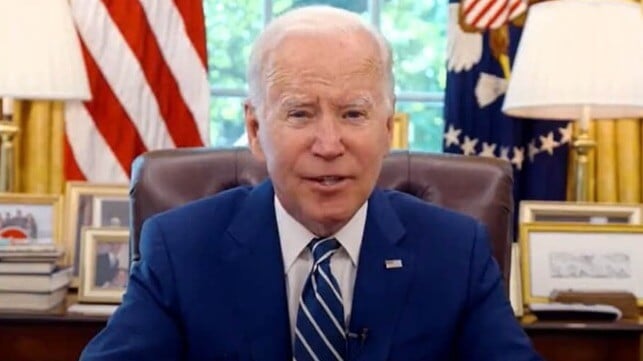President Biden Says Shipping Costs are Major Part of Inflation

President Biden released a new message citing the ocean carriers and specifically the lines operating on the Pacific as a major contributor to the inflation Americans are currently experiencing. Calling it “outrageous,” he cited the price increases for shipping on the Pacific saying that the U.S. Congress needs to act to “crackdown on ocean shippers.”
A minute and a half long video released with the president’s message includes examples from the executives of Tractor Supply Company, Jo-Ann Stores, and the American Farm Bureau Federation each telling the president how their organizations are being impacted by the dramatic increase in shipping costs. The president responds by saying, “We have got to change this. This won’t solve it all, but it will solve a big piece of it,” referring to the pressures on American companies and the current high inflation levels.
During the message, the president contends that there are just nine shipping companies transporting goods between Asia and the United States. He says they have raised prices by as much as 1,000 percent to transport containers across the Pacific. “One of the big reasons prices are going up is the cost of shipping things across the Pacific,” the president tells the listener.
One of the reasons prices have gone up is because a handful of companies who control the market have raised shipping prices by as much as 1,000%. It’s outrageous — and I’m calling on Congress to crack down on them. pic.twitter.com/eLIdQBmskJ
— President Biden (@POTUS) June 9, 2022
It is the second time the president has directly confronted ocean carriers. At the end of February, he announced a new enforcement effort targeting antitrust violations by the three major shipping alliances. He directed the Department of Justice to work with the Federal Maritime Commission to promote competition and enforce antitrust laws while also calling on the U.S. Congress to reform the Ocean Shipping Act. In his new message, the president said he is prepared to sign the Ocean Shipping Reform Act once it passes the House of Representatives as early as next week.
The White House has cited the rapid growth in the three alliances noting that from 1996 to 2011 the alliances operated about 30 percent of global container shipping compared to today where they control 80 percent of global containership capacity and 95 percent of the east-west trade lines. During the annual State of the Union Address in March 2022, President Biden cited the record profits reported by the large carriers saying they had been able to raise prices due to a lack of competition and concentration within the three alliances.
Last week, however, detailing the findings of its two-year fact finding on the supply chain and ocean carriers, Commission Rebecca Dye’s report dismissed as a misconception the idea that shipping services were concentrated. The FMC concludes in its report that “the current market for ocean liner services in the Trans-Pacific trade is not concentrated and the Trans-Atlantic trade is only minimally concentrated.” The FMC cited a lack of capacity and excess demand as contributing to the supply chain issues while saying there was strong competition among the carriers. The FMC called for overhauls in the relationships between carriers and shippers and tighter enforcement of regulations.

that matters most
Get the latest maritime news delivered to your inbox daily.
The carriers also pushed back against the White House saying that concentration was not the problem. "The current supply chain disruptions are the result of a historic surge in demand by Americans for goods from overseas. There is no market concentration 'problem' to 'fix,' and punitive measures levied against carriers based on incorrect economic assumptions will not fix the congestion problems. Only normalized demand and an end to COVID-related operational challenges will solve the bottlenecks in the supply chain," said World Shipping Council President and CEO John Butler in March 2022.
In today’s message, the president calls on the House of Representatives to pass the legislation which he says he will sign. The bill is the first overhaul of the Shipping Act since the 1980s and addresses the FMC’s oversight authority. It focuses on enhancing the export market by increasing reporting requirements for the carriers and on the fees charged by carriers. It does not directly address shipping costs or competition but gives the FMC new rulemaking and enforcement authority to crack down on unfair business practices by the carriers.
